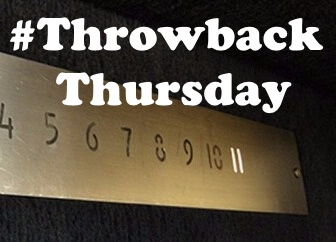Three Must-Read Memoirs by Fierce Black Women
I’ve been reading a lot of memoirs lately, primarily by women. There are other posts about these memoirs waiting in the wings, like “memoirs about mental illness,” but for now I want to focus on three excellent memoirs written by amazing, inspiring Black women.
5 Questions With… Jacob Bacharach
Five Questions With… is a series of short interviews with local authors and persons of interest. Today we’re featuring Pittsburgh author Jacob Bacharach, who will make an appearance at CLP – Main on Wednesday, from 6:30 to 7:30 pm. Bacharach has written two books, The Bend of the World and The Doorposts of Your House and On Your Gates. Both novels feature Pittsburgh, and both have been described as “madcap” by reviewers. Think UFOs, legendary monsters and re-framing Biblical stories.
Throwback Thursday: Solomon Northup: Keeping the Legacy Alive
Last year, a patron named Clayton Adams showed me an amazing story that taught me a lot about injustice, resiliency, and hope. It began with trust, followed by deception and injustice, and ends with justice and reunion. And the fact that this story happened at all and that we can go out and read or watch it (I encourage you to do both) is what ultimately gives me hope that we will progress. This story is called Twelve Years a Slave by Solomon Northup.
Testimony Serves Up Intrigue in Former Yugoslavia
Every once in a great while a reader has an experience in reading that spills over into real life. For me, it happened on a Viking cruise along the shores of Croatia when I was riveted to the pages of Scott Turow’s new novel Testimony, set in the aftermath of the war in the former Yugoslavia (which includes current countries like Serbia, Croatia, Montenegro, etc.).
5 Questions With… Author Scott Turow
Scott Turow, author of ten best-selling novels that have sold more than 30 million copies world-wide, will visit the Lecture Hall at 7 pm on May 17th. We caught up with Turow as he prepares to embark on a national tour to launch his new book Testimony, which the New York Times calls “spellbinding.” Testimony comes out on May 16th, and a copy of the book is included with every ticket purchase for the event on the 17th.
Who Wrote It Better? Hillbilly Elegy and White Trash
Last year’s notable “twin books” were Hillbilly Elegy: A Memoir of a Family and Culture in Crisis by J.D. Vance and White Trash: the Secret 400-Year History of Poverty in America by Nancy Isenberg. The first is a memoir and the second a volume of history, but both examine the plight of poor and working-class whites in America. Hillbilly Elegy has been on the NYT Bestseller list for 39 weeks now, along with making the rounds in media and landing on several lists that purport to explain Trump’s successful run for president to those who thought a Clinton victory was in the bag.
Throwback Thursday: Mingus, Mingus, Mingus!
Charles Mingus is one of a handful of the most important jazz composers of the 20th century. He was a giant of jazz, an innovator whose music blends classical, bop, and free jazz to create something else again. In addition, in the volatile time that he lived, he was an unapologetic advocate of civil rights in the United States.
How Does Your Garden Grow?
I’ve been very slowly redesigning my front garden and planning where I want to put some fruit trees. Several things are helping me through this process: my grandmother and mother’s advice, my garden journal packed with notes and observations from the past few years, and lots and lots of books on gardening in general and garden design in particular. I can’t provide you with a grandmother or a pre-filled garden journal, but I can share the books that I’ve found most helpful in my garden design process.
Novels and Memoirs Told in Poetry
When most people think of poetry, they think of rhyming lines broken into stanzas that go on for about a page or so. Rarely do they think of the many novels, memoirs, and folktales told entirely in verse, whether it be formal (i.e. Shakespeare’s iambic pentameter) or free. These are often great places to start for those who find poetry intimidating or difficult to understand, as I once did.
An Interview with Olive Witch Author Abeer Hoque
Abeer Hoque was born in Nigeria to Bangladeshi parents and moved to Pittsburgh when she was thirteen. She struggled to find her place in America, and eventually moved to Bangladesh on her own, where she still didn’t quite fit in. She details her multicultural growing-up and coming-of-age story in a new memoir called Olive Witch. Abeer will be at CLP – Main on Wednesday to give a reading and answer questions, but I was able to catch up with her via email in advance of her event.

